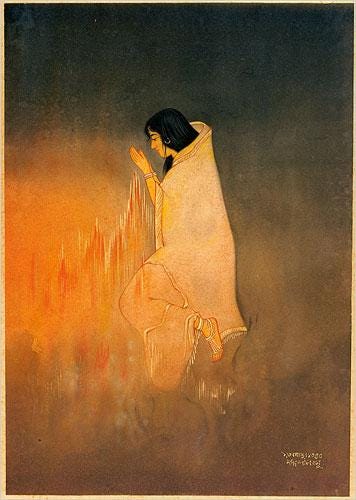Kokila maa was to be called after Jyoti had taken 217 boys from the Bahar district in Calcutta.
The three heads of the district had to agree on it. But the only scholar among them was sceptical of her. Ramkanto was not able to understand why they were calling someone for a solution when they didn’t understand the disease plaguing their lands.
“She only comes at the death of men.” Abhoy spit the tobacco he had been chewing on the ground. The rich Zamindar had lost half of his staff at the hands of Jyoti. With Angrez taking most of his earnings in taxes, his farms were barely earning enough to feed his family.
The first Jyoti was seen in his village. It was on the morning next to the funeral of their Mukhiya. The victim was the leader’s brother. The young man had gone out to relieve himself in their farms when Jyoti came from the woods. Engulfed in her flames in a few minutes, he could not scream for help.
The burnt body was reduced to half, and there was no wife to be burnt on the pyre along with him. The local English police had more things to do than investigate an Indian’s murder, no matter how prominent the family was.
Only Kanu had seen the murderer. No one believed the old drunkard when he said he saw a burning woman walking away. The matter was about to be shut when a similar figure claimed another boy from their village.
"But she came after the death of Pandit Ji’s wife.” Dibakar knew the local priest personally. It was difficult to watch a family he knew wiped out in three days.
Pandit Ji’s son had just turned sixteen when he lost his father to alcohol and mother to Sati a day before. He was drinking in his home. His friend claimed that there was a burning candle beside his cot when he left late at night. The neighbourhood children claimed they saw a woman walking away from the hut, burnt down to the ground. Her dress left a burning trail behind her.
The sightings increased and spread to the whole area. If there were no young men in the immediate family, then distant relatives, friends, and even neighbours were at risk.
Many people had seen her by now, but the description varied. Some said she was tall, some short. Some people said she wore a wedding lehenga, and some claimed she wore a red saree. But they all agreed that she walked away burning from head to toe, never seen again. Jyoti's name was given by an old lady who saw her brother being burnt alive. She kept muttering how the burning figure looked like the flame in a diya, Jyoti.
Dibakar knew it was the wrath of Gods. He kept tapping his foot on the ground. He was living in continuous fear for his family's life after Jyoti had claimed his younger brother’s. Someone had angered their ancestral spirits. This was their way of punishing them.
“Kokila thinks she only comes when a married man dies.” Ramkanto Roy was confused about why this was happening. But he trusted his wife’s instincts. She was an intelligent woman.
“But, Mrigraj was a widower. Wasn’t he?” Abhoy took out more tobacco to chew on. Foolish women. What do they know about these things?
“Single men then. But what stops her from coming after us?” Dibakar fidgeted around with his dhoti. He was breathing heavily and refused Abhoy’s offer of tobacco.
The three most respected men of the district were meeting because they could not stop the deaths. Their crematory grounds were burning every day. There was constant smoke in the air. No one could find a solution. Elders had never seen anything like this, and they could not figure out the reason why this was happening now.
Ramkanto had failed to find anything in all the books he had been reading for any mention of a figure like her. “It hasn’t happened till now. But we need help. Nothing the people do is working in getting rid of her.”
Men had started locking themselves and their family members in their homes if someone died. Some escaped the fate like Hira, whose mother died because of typhoid. He had also spread water around his hut to ward off the fiery spirit. But widower Mrigraj was not spared when he did the same thing after the funeral of his younger brother.
Everyone had started keeping buckets of water in their homes. People had stopped going to the farms alone. Some families even left for far-off lands when someone died in their vicinity.
There were attempts to capture Jyoti once. Dibakar’s villagers sat in an open ground for the whole night when a young girl died after falling into the well. But Jyoti did not come.
“Only Kokila maa can save us now!” Dibakar touched his ears in turn with his right hand, not worthy to speak the name of the reverent woman.
The old scholar rolled his eyes while Abhoy sat straight, “You are right. My brother-in-law called her when they had a Pischacni haunting their lands. Maa ran her away in a night.”
“Your father already had a big hawan last month, right? It didn’t work.” Dibakar hung his head and huffed at Ramkanto’s reproach. His father gave him three of their best cows, yet the man bore no results.
“The man turned out to be a fraud.” He muttered under his breath. He did not tell the other two men that he was found dead a week later, burnt behind his house.
“I am in favor of calling her.” Abhoy finally stopped smoking. He turned serious to convince his scholar cousin. At this point, he was ready to beg if that person could extinguish the Jyoti.
So Kokila maa was called despite the learned Ramkanto's reluctance.
“No one can take her away.” The lady told the scholar in person after she had done her Pooja at the biggest temple of the district, in Ramkanto’s village. His eyes widened at her honesty. But he maintained his stance of folded hands and bent frame in reverence to her status in front of the people.
“Why do you say that, Maa? I am sure with your blessings, she will not bother us again.”
She raised an eyebrow at his lies, “Do you know why she haunts these lands?”
The older man hung his head in real shame this time. The couple had been pondering over this while they were dealing with their elder son’s worsening health. It was a major reason Ramkanto had agreed to have her in his home, hoping she could help, “I am afraid not, Maa.”
“The deaths happen in number of three. One natural, one forced, and one deserved.”
He started breathing harder at her statement. He understood what she meant. But he did not want to believe it. He took a step back, “It has been the norm…”
“A wrong one. A life taken for another is wrong. It is not only your area that is facing her wrath. She is rising all over. She will not stop till you do.”
“I…I can’t say that to my people. They would never accept this.” Sweat appeared on his temple. Despite being a well-read man, he was still a part of the community which held age-old beliefs. No one could raise a voice against the whole belief system.
“The more women you burn for your pride, the more Jyoti will rise to avenge her early demise.”
Their heads swung at the water pot, now lying broken on the ground. Somebody was there. They could not see who.
Maa left without looking back. Foolish men.
“Bapu ji! Mohan! Save me!” The young widow screamed as she was dragged to her husband’s burning pyre. Ramkanto looked away from the sight of his begging daughter-in-law. His wife was not allowed to see their son’s funeral. His younger son was held back by the elder men of the community, Abhoy being one of them.
Dibakar had taken to drinking after he lost the last of his family last week. He would not come out of his home for anyone.
“Bapu ji, rokiye inhe.” Ram Mohan pleaded for his sister-in-law, “Kokila Maa had said the same thing. We can stop this.”
Tears fell without bar from the broken Ramkanto's eyes. Not only because of his son but now his daughter and the coming death he could see in his family, most likely the son struggling to break free. He had tried convincing others. They mocked him. And they spat at the mention of Kokila Maa now that she had also failed in her promise.
“Mohan!” The young woman was dressed in all her bridal finery. She refused to take the afeem that the women in the house were forcing her to eat. She was fully aware of her coming death. Her screams rose in the air as she again called out to the only person who could save her.
Mohan thrashed around till he broke free, “Bhabhi Maa!” She was thrown into the fire before he could reach her. He screamed and cried at her howls of pain till the couple was reduced to ashes.
Ramkanto had to be helped back into the house while his only son never went back. Jyoti came in the morning to see him lying at the same place she had left him in.
“Mohan!” Abhoy had come to the ground to pick up the remaining bones. They had to be collected and given away to the holy river by the family.
Mohan woke up as she came closer. He squinted, not believing the sight in front of him. Yet the young man was ready for his fate, disappointed at his failure to save his sister-in-law.
Jyoti went past him to the man leaning down on the ground, picking up her bones.
Sati was an age old practice in Hinduism where the wife was burnt on the pyre of her husband. When Raja Ram Mohan Roy, an Indian reformer and founder of Brahmo Samaj, saw his sister-in-law going through the same fate after his elder brother died, it left a lasting impact on him. He went on to work against it and his efforts bore results when it was abolished in 1829.
If you liked this story
You can also recommend The Indian Story. Or Simply share this story for other readers.
This story is my second entry to the Lunar Awards Season Six. The first entry is





Hi Isha, glad to have discovered you through this story. Intricately woven and grippingly told! Loved it!
Nice fusion of history with the supernatural.